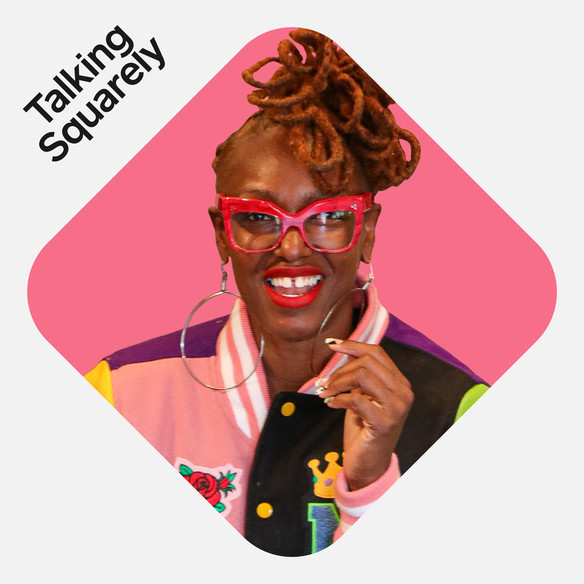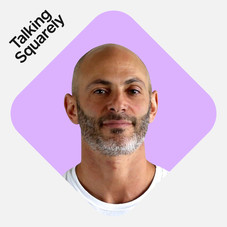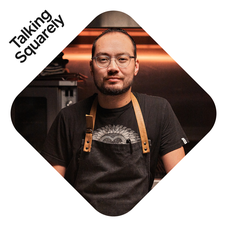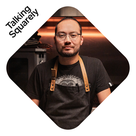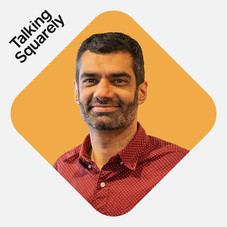Table of contents
A little bit about this episode on the successful pivots two business owners have made…
As the world changes around us, businesses of all sizes are pivoting and reimagining what and how they sell to customers. From the “new normal” to the “next normal,” business owners are leaning into a startup mentality — rethinking their pre-existing models of success and seeking out new or unforeseen opportunities. In this episode, we speak with two business owners who have adapted their businesses to meet the emerging needs of the time, and how this has shifted their thinking about long-term business planning and their vision for the future.
This episode features Angel Gregorio, owner of The Spice Suite in Washington, D.C. and Bailey Ryan, owner of PlantBar in Virginia and North Carolina. Want to know a little bit more about our host? Follow Square’s Nelson Murray for more.
“My grandparents actually had a rare seed company on eBay and that was the business that my parents took over. And then we started selling air plants. So really small air plants. They don’t have any soil and they’re really easy to ship and they go in terrariums. So for a while, that’s the only type of plant we sold in our retail space.” says PlantBar owner Bailey Ryan. The retailer eventually grew to a market of plants in their retail space and then a truck, quickly gaining ground before the pandemic hit.
“That was our biggest concern when we went fully online is, will they have the same experience that they had in the store that they are through online purchases?” says PlantBar owner Bailey Ryan. She turned to Instagram stories to give a more one-on-one feeling to her customers, a personal shopping experience online that translated to a huge gain in Instagram followers.
The Spice Suite owner Angel Gregorio has also not been able to welcome customers or other guests since the start of the pandemic. Some of her frequent guests earned the moniker of the “spice girls” a consortium of women who regularly pop-up within the store. This created a pseudo membership service for her customers, at no additional cost. “They pop up regularly at the shop and sell their products, and while they’re selling their products, they sell mine.” she says “So that provides me with some relief and excitement, because we’re still supporting small business but not on the scale that we were before, because we don’t get to invite those guests in.”
Without the spice girls, Gregorio had to find a different way to connect with customers and adapt to changes with her business. The Spice Suite started with Gregorio hand mixing spice blends, bottling and labeling them herself. Now with over a hundred spices, the products are co-packed by a manufacturer off site, something she says was a pricey part of growth during COVID-19.
“So I knew I needed to get there and I knew that that was also going to be integral to us being able to grow our online presence and I didn’t want to attempt to open an online store, open up ourselves to eCommerce and not be able to meet the demand.” she says “Until now, we’re just slowly increasing the inventory online as we continue to grow slowly and I always tell folks and tell my followers on social media that we are going to grow this business, but we are going to grow this business at a pace that makes sense for me.”

Full transcript below:
Angel Gregorio:
In business ownership, there’s always something. There’s always something new that you could be doing to improve the business. There’s always some new system to implement, some new thing to make things easier, and, for me, I got into business ownership, while it was this very, I describe it as, a serendipitous journey, I knew that the moment I put both feet into it, that the goal was immediately about freedom.
Nelson Murray (host):
Hi, I’m Nelson Murray, and this is Talking Squarely. In this series, we bring together independent business owners to have frank discussions and share their perspectives on some of the most pressing issues impacting their lives and livelihoods. Part of being a business owner is learning to roll with the punches.
As the world changes around us, businesses of all sizes are re-imagining what and how they sell to customers. From navigating changing health guidelines to embracing eCommerce, small businesses are pivoting from their original concepts and taking on new opportunities. Today, we talk with two business owners who have evolved their businesses to meet the needs of the time and how this has shifted their thinking about long-term business planning and their vision for the future.
Angel Gregorio:
I have always embraced change. I think it’s cool. I think it’s fine. I think it brings about something new, and I’ve never been afraid of it. Clearly, to go from being an assistant principal to a spice girl, I’m not one to shy away from new and unexpected experiences. So yeah, I think that change is where the real fun happens.
Nelson Murray (host):
That’s Angel Anderson, the owner of The Spice Suite in Washington, D.C. In 2015, she left her job as an educator to open up a spice shop and dream incubator that hosts pop-ups for local Black owned businesses and offers unique spice mixes inspired by Angel’s travels.
Angel Gregorio:
The Spice Shop that existed five years ago when I opened was really just like a hodgepodge of things and ideas and what I thought a spice shop was supposed to look like without having any real frame of reference for one. And as this shop has evolved, as time has gone by, and I’ve, of course, become more resourceful, smarter, learned how to spend money in a way to makes sense, and just run a business and implement system, this space has evolved into what we call a dream incubator.
Nelson Murray (host):
For Bailey Ryan, the owner of PlantBar, the original challenge was taking her parents’ existing plant business and turning it into an experiential place for workshops.
Bailey Ryan:
I wanted to have an experience based business. I want people to be able to come into the store and it be different than going out and going on a date night and then packing up and going home and all you have left to take home is a dinner and a full stomach. I want something that you take home and you’ve learned something and you have something that you created. Then we started doing terrarium classes and those just took off and went crazy. So then we really focused in and said, “Which part of our business do we want to focus on? What’s happening now and what do our customers want?” and ultimately it was the experience.
Nelson Murray (host):
When she was in high school, Bailey’s parents ran an online store, offering seeds, air plants, and trim kits. Although she helped them out as a student, in typical teenage fashion, she had decided to break off and pursue a career in medicine. However, when Bailey was in school, she decided she was more of a hands-on person and offered to build out the family business into a brick and mortar space. Bailey, will you tell us what the original idea or ideation for the PlantBar was and how that original version has adapted in the face of 2020?
Bailey Ryan:
Absolutely. So originally, we were completely half and half. We were half retail, which is our plants, ceramics, and plant accessories, and the other half is our terrarium workshops. We do it in a communal table setup. So you come in, you can fit about eight to ten people per table and all of terrarium supplies are shared. So you grabbed glass off the wall, the pricing is all inclusive, so that includes your plants, your decorations, and all the materials you need to build your terrarium and then you just pick and choose what you’d like off the table. So with COVID, not only did we have to shut down, but when we eventually reopened, we couldn’t reopen that side of our business. So we did take home kits. So you could order a kit online and we would pack up a very simple version of a terrarium. You’d be able to pick it up from the store and take it home and build it.
And when we did reopen the stores, we’d still have take home kits but you’re able to actually come in and choose the pre-bagged supplies for the terrarium and take it home. We did open our Charlotte location October 24th and that’s a much bigger space than we are in Richmond, Virginia Beach. So we were able to open every other workshop table, and it’s if you come in, you just have to be within the same group who’s at your table and six feet apart and wear gloves and we have throwaway tools and the jars get switched out every single time a party leaves.
Nelson Murray (host):
Same question for you, Angel. I know that you had an interesting story since opening The Spice Suite. Previously, you were an assistant principal and you decided to become your own boss rather suddenly, right?
Angel Gregorio:
So, for me, my journey was probably the most serendipitous thing that has ever happened to me. I was leaving a nail salon one day and happened to notice a for lease sign, and I had never inquired about a commercial space ever, never had a plan or desire to own a brick and mortar business of any sort. But for some reason, I called the landlord just wanting to know, because it was in a neighborhood I grew up in, a few blocks away from our neighborhood. And so I just wanted to know what commercial real estate costs in that area. Three and a half weeks later, I opened what is now The Spice Suite. I left my job a month and a half after that conversation, and that was five years ago. This space has evolved into what we call a dream incubator, because aside from selling spices and balsamics [vinegar] and infused cream honeys and all these decadent, beautiful things that make your food taste good and look beautiful, we also invite community into our space pre-COVID.
So that has probably been like our biggest shift, is the inability to invite community in. We have become known for the ways that we have allowed small Black business owners to share space with us completely free of charge and so with COVID happening, only being able to have our group of women that we call a Spice Girls, which are our core group of pop-ups in the space, that has been a huge shift for us, and one that is honestly really, really difficult, because that is what our business has almost become built on.
Nelson Murray (host):
What was your interest and appreciation for spices? Where did that come from?
Angel Gregorio:
I like to cook, but I didn’t frequent spice shops. I honestly don’t know. I just said, “Spice Shop,” of all the things in all the world, and it landed. For some reason, it landed, and when I went in to see the space a couple of days later, it already had shelves and things in it and I started to see it like, “Yo, my bottles can go here. I can do this.” and I was thinking it through, and the landlord is looking like, “You seem awfully surprised at these ideas that you’re saying out loud.” And he had no idea that I didn’t have a plan for this and he took a leap of faith on me. I knew the business owners on the block and they vouched for me and I sold him on this idea, and that was that.
Nelson Murray (host):
Bailey, talk to me about where your appreciation for plants came from and why was that, that was the way that you want it to manifest your own business as opposed to something else, selling something else?
Bailey Ryan:
Yeah. So similar to Angel, I was never a plant person. My grandparents actually had a rare seed company on eBay and that was the business that my parents took over. And then we started selling air plants. So really small air plants. They don’t have any soil and they’re really easy to ship and they go in terrariums. So for a while, that’s the only type of plant we sold in our retail space. I tried a plant market. So I called up must’ve been a hundred suppliers in central Florida and said, “Do you sell tropical plants? I don’t know anything about them but my customers want them. I want to bring them in.” and we did a little market in our small retail space and it just took off and went crazy. So we started doing those once a month.
Eventually, we started getting a truck and it’s funny how much you grow along with your business, adapting to new things. And now I have 100 plants in my house and I know way too much about plants than I ever thought I would know. But yeah, I was never a plant person, but I certainly am now, and it’s a huge community.
Nelson Murray (host):
Can each of you speak to the emotional journey you went on as you decided what pivots to make this year? How did you end up getting help with trying to figure out how to make the pivot and adapt to healthcare requirements while keeping the business financially healthy?
Angel Gregorio:
Yeah. So, for us, because we are a spice shop, we were considered essential, so we could have remained open, but we closed just because of my concern for the health of myself, my staff, my clients, and customers. And as the months started to pass, then it was like, “Whoa, okay. So this is really happening. We are really having to change the way we look at retail.” and of course, as the months are going by and COVID is getting worse and not better, we’re hearing about major retailers closing. So we started to shift online. We had an online website, but we weren’t doing a lot online, honestly. We just did the bare minimum just to maintain some sort of presence. And we started to do what we were calling Spice Boxes, where we would mix a bunch of cool spices in a box and folks can buy those, but you can’t choose what’s in the box. And that really took off and became super, super lucrative for us. And I’m grateful that we were able to thrive in a time with so many businesses weren’t. I’m grateful that I’m doing well, but I have friends who have businesses that aren’t. And that is just really difficult to even celebrate my successes when everyone isn’t winning in the same way.
Nelson Murray (host):
Talk to me about the community oriented aspect of The Spice Suite. You mentioned earlier that part of your business and a major draw is that you’re able to offer your space up to other Black owned businesses in D.C. How have you been able to accommodate and meet that same goal? Are you still working with those folks?
Angel Gregorio:
We have not been able to welcome any guests, and guests are the folks that are not Spice Girls. So Spice Girls are the consortium of women who regularly pop up at The Spice Suite and they’re almost like a membership service, but it’s completely free to them. They pop up regularly at the shop and sell their products, and while they’re selling their products, they sell mine. So that provides me with some relief and excitement, because we’re still supporting small business but not on the scale that we were before, because we don’t get to invite those guests in.
Nelson Murray (host):
Bailey, I know that you’ve started to engage with your customers on Instagram but how have you bridged the gap for them of what it’s like to actually experience your products in their home now that they can’t come to the store?
Bailey Ryan:
That was our biggest concern when we went fully online is, will they have the same experience that they had in the store that they are through online purchases? And we gained a huge following on Instagram during this time because we made it a very personal, almost one-on-one feeling. We get on our Instagram stories and we would go through the entire plant delivery truck almost like a talk show. Me and my general manager would be there until midnight talking back and forth about what plants came in, what they can do for your house, are they pet friendly? Putting an actual face to the camera, so it gives not only that personal shopping experience, but hey, there’s a human running this store behind the scenes and it’s not just products getting loaded onto a website.
Angel Gregorio:
Social media has been our saving grace. Instagram has always been our major platform and where we communicate best and most with our customers and, of course, now through COVID and recognizing that not everyone is on Instagram and there are other platforms, we were even overlooking Facebook, honestly, in the beginning, because there was so much traction on Instagram. And now we’ve been doing that and even having to send square emails out to folks, but now I feel the need to over communicate because things are changing.
Bailey Ryan:
Absolutely. We’re still trying to push business, but we’re also trying to keep it safe. So it’s a tough juggle but I’m glad to know that we’re not the only ones.
Angel Gregorio:
Yeah. I definitely hear some similarities and synergies and I think our fluidity and just ability to pivot and shift and not be afraid to try something new, even if it’s something that we’ve never done before. And that’s pretty admirable and I’m super interested just listening to your story.
Bailey, it’s kind of fun because I’ve also fallen in love with plants during COVID and had time to take care of them in ways that I couldn’t before. So I’ll definitely be following along too.
Bailey Ryan:
I love it. Welcome to the family.
Nelson Murray (host):
How do you think that your business or maybe even your industry is going to change in 2021 and beyond?
Bailey Ryan:
So the plant supply has become incredibly scarce. All the nurseries in central Florida are just wiped out. In March, during all the craziness, I actually had to fly down there just to get a full understanding of what was happening. At this point, it’s eaten so far into the industry that they can’t make soil to grow the plants and they don’t have staff to make the tissue at the labs. And now overseas plants, those are really hard to come by. And so we’ve had to change our plant offerings. We don’t have the same plants that we may have stocked six months, eight months ago that were a bestseller. So, unfortunately, I think we’re going to have to look overseas for tissue and starter seeds and stuff like that, which isn’t something we’ve had to do before.
Nelson Murray (host):
Angel, what about for you? How do you think your business or your industry will change in the year ahead?
Angel Gregorio:
I have already seen tons of folks tagging me and reaching out for advice on how to start spice businesses. I think that, I mean, so many people are going to want to jump into this industry before they realize how much work it really takes. So I definitely think that this industry will continue to grow, and that is something that is actually exciting. For us, in the beginning, there were several spice shops in D.C. and around D.C. so our goal was always to be different. I would tell guests when they would come in the shop, “We are not the place to come if you’re looking for pink salt and black pepper.” We didn’t sell it then, we don’t sell it now. We won’t ever sell it because you can get that anywhere, including your grocery store. We’re the place to come when you want to have fun.
I did not want folks to come in and say, “Oh, I have something like this at home.” I really want them to come in and think like, “Wow, I’ve never seen, smell, tasted anything like this before.” and now after, what, I think as of six months ago, or maybe a little longer, we are the only spice shop in D.C. Every other spice shop in D.C. has closed and so we get even more creative freedom to do what we want to do because we, in some ways, have a monopoly on the market in terms of physical presence here. I don’t see these newer spice shops as competition. For me, there’s enough space for multiple people to open spice shops. I think what makes The Spice Suite unique will continue to make us unique and allow our customers to be ours uniquely.
Nelson Murray (host):
What is each of your relationship to scaling or growing your business been like?
Angel, it caught my attention that you described the sense of going online and adding an eCommerce component to your business as almost akin to opening another physical location. To me, that says that it was a really big hurdle or a big challenge that you felt like was ahead of you and maybe one that you weren’t quite ready for.
Angel Gregorio:
I’ve always known that I wanted to scale the business and for me it was like I had to, because in the very beginning of The Spice Suite, I was literally mixing spice blends by hand, bottling them, labeling them, writing on them. It was a very manual, very labor intensive process. And, for me, scaling has been this incremental thing. My co-packers have minimums, and to be able to meet their minimums, sometimes that means ordering 2,500 of a single spice to be able to work with them. I have over a hundred and five spices, so this has not been an inexpensive growth for me over COVID but I am now at a place where a hundred percent of our products are now co-packed and I don’t have to bottle, label. I’m not making jam and hot sauce at home anymore. It is all happening offsite by a manufacturer that has the capacity to do it.
So I knew I needed to get there and I knew that that was also going to be integral to us being able to grow our online presence. And I didn’t want to attempt to open an online store, open up ourselves to eCommerce and not be able to meet the demand. And so I knew I wanted it to be ready for that, and now we’re ready for that and we’re just creeping up. Until now, we’re just slowly increasing the inventory online as we continue to grow slowly and I always tell folks and tell my followers on social media that we are going to grow this business, but we are going to grow this business at a pace that makes sense for me.
Nelson Murray (host):
Bailey, what about for you? What has your relationship been like to the idea of scaling your business?
Bailey Ryan:
Once we got our first location up and running and we hit our goals for the year, we took a breather of, “Okay, we made it. What do we want out of this?” So being able to properly staff our store, put operations and systems in place so that we’re not getting pulled in, it was a huge point where we were able to step outside of it and truly make a plan for ourselves.
Angel Gregorio:
So I had a question. Because you have multiple businesses, at what point did you know you were ready for the next one?
Bailey Ryan:
When we were fully able to be out of our store in Virginia Beach. The staff didn’t call us to come in to unload a truck. It was a good three weeks that we did not have to go into that store for that location specific issues. They handled it, and I didn’t hear about it. That’s when we knew, “Okay, they’re kicking us out. We’re ready to go to Richmond.”
Nelson Murray (host):
I’m curious for each of you, what is it that you wish you’d known back in the beginning of the year about how to make this current version of your business as successful as it could be? Or where there hurdles that you overcame that you were like, “Gosh, I wish I’d known that I could’ve done it this way, if I had another chance”?
Angel Gregorio:
What I wish I had known before is that I could do just as well selling online while maintaining the brick and mortar. I was so nervous about leaning into eCommerce, because I love the exclusivity of just this one flagship store. But hiring a team, I now have an operations team that manages everything online and I don’t even have to touch it, and I also didn’t think that, that was something that I would be able to afford to do. Some of the things that I’m able to do now during COVID are things that I set for two, three, four years down the road to be able to financially and operationally be able to implement. I just wish that I knew that putting good systems in place would allow me to expand and scale a little quicker than I thought it would. It wasn’t just about the money. I always thought it was financially I needed to be in this place and meet this goal before I could scale, as opposed to, I need to just implement these systems and then we can slowly scale.
Nelson Murray (host):
And Bailey, what has that process been like for you? What is it you know now that you wish you had maybe at the beginning of the year or end of 2019 in anticipation of what 2020 has brought?
Bailey Ryan:
Honestly, the same thing. We weren’t planning on going online until we had our third location in Charlotte up and running, because we had been working on that since January. We signed that lease and we just opened two weeks ago. So we shut down our stores March 13th and two weeks later we launched the website. We didn’t realize we would gain that much traction in that short amount of time. And now we’re looking at a warehouse space to put a small shipping facility and crew in, and that’s just not something we expected for 2020.
Nelson Murray (host):
I’m curious what advice each of you would give for other business owners out there. We talked about this a little bit earlier that the need to pivot, the need to adapt or to try new things, maybe that even just means adding a new product line to your business.
Angel Gregorio:
It’s always been just to start now and perfect later. Sometimes I think our desire for things to be completely perfect and exactly right keep us from starting, and COVID I think has taught all of us that you will have to adapt and change and start something or you’ll get stuck and you won’t be able to move forward at all. So I think that at the point where you are ready to just go with it and try it and start the perfection can happen over time.
Nelson Murray (host):
And Bailey, what about for you?
Angel Gregorio:
Embrace the change. Like I said, pivoting for us, going online was incredible. I never knew that we would have the amount of support we have from our customers. And it’s specific to you. Yes, people wanted plants in their home and they want to start this new hobby, but they could have gone to Home Depot and Lowe’s that were able to stay open during the pandemic and go in and shop in person. But they chose us and they chose to buy from us, support us. We had people dropping off Starbucks just for bringing an order out to their car. It turned out to be a great decision and now we’re looking to have our website open by the holidays for people to order online and ship to their loved ones that aren’t local to any of our stores. So embrace change and adapt with the changes that are just about every day now.
Nelson Murray (host):
A special thanks to Angel and Bailey for their perspectives on pivoting their businesses in dealing with the changes brought on by our new normal. The Spice Suite is located in Washington, D.C. Check them out online at thespicesuite.com. PlantBar, Soon to be known as PlantHouse, has locations in Virginia Beach and Richmond, Virginia, as well as a new outpost in Charlotte, North Carolina. You can find them online at plantbar.net.
You’ve been listening to Talking Squarely, a Square production. This episode was produced by Mallory Russell, Cindy Lewis, Kira Deutch, Evan Groll, Travis Gonzalez, and Camille Kail. Our music was composed by Jordain Wallace, with sound recording by Sorrentino Media and Jamie Cohen. I’m Nelson Murray. Thanks for listening.
The views and opinions expressed in Talking Squarely are those of our guests and do not reflect the official policy or position of Square.
![]()

